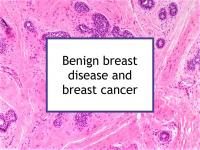Women with benign fibrocystic breast disease have higher breast cancer risk than the general population. However, the elevation in risk depends on the type of benign breast disease. Women with proliferative disease without atypia have modestly increased risk of breast cancer compared to women with normal breasts or non-proliferative disease.
On the other hand, those with atypical proliferative subtypes (atypical ductal hyperplasia or atypical lobular hyperplasia) have relatively high risk.
Approximately 70% of women who have a biopsy for benign breast disease have non-proliferative lesions, 26% have typical hyperplasia (which is associated with approximately two-fold increased risk compared to the general population), and 4% have atypical hyperplasia (which is associated with approximately five-fold increased risk).
Benign breast disease tends to be more prevalent among breast cancer patients with early diagnoses (20 to 44 years) and in those with a family history of breast cancer. One study concluded that women under age 35 diagnosed with atypical hyperplasia should be followed closely, receiving annual breast cancer screening starting at age 25 or age of diagnosis. This was based on the fact that 12% of such women developed breast cancer within a median of 90 months of their diagnosis with atypical hyperplasia.
Women with benign breast disease who also have dense breasts are at particularly high risk for future breast cancer. One 2021 study reported that women with high breast density, as well as benign breast disease, had three times the risk of breast cancer compared to those without benign breast disease and with breasts having mostly non-dense tissue with some areas of higher density. Regular exercise appears to reduce the risk of benign breast disease.
Foods that reduce risk of benign breast disease
The following foods are excellent sources of micronutrients that have been found to reduce the risk of benign breast disease:
A one small 2020 study reported that women consuming a diet high in phytochemicals (in other words, high in colorful fruits and vegetables) had a markedly lower likelihood of developing benign breast disease than women with relatively low consumption.
Please read the applicable food webpages when making your own food lists since these pages contain important advice, food rankings (e.g., highly recommended, recommended in moderation), consumption limits, and other pertinent information.
Foods that increase risk of benign breast disease
The following beverages have been found to increase the risk of benign breast disease:
- Alcohol, all types
- Coffee
- Highly caffeinated drinks
Sources of information provided in this webpage
The food lists above, which are updated continually as new research becomes available, have been developed based solely on the results of academic studies. Clicking on any of the foods will take you to its webpage, which contains specific information concerning that food's relationship to breast cancer, including its overall recommendation, as well as links to supporting studies.
Below are links to 20 recent studies concerning this topic. For a more complete list of studies, please click on benign breast disease.
